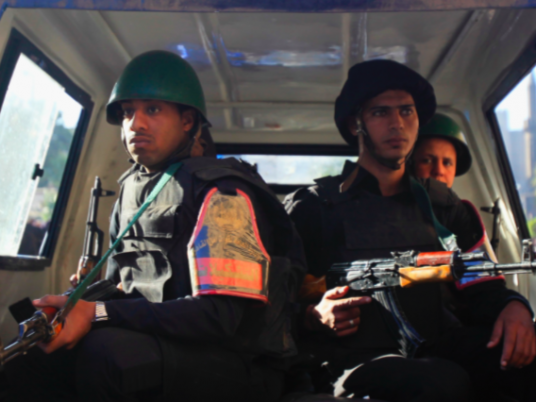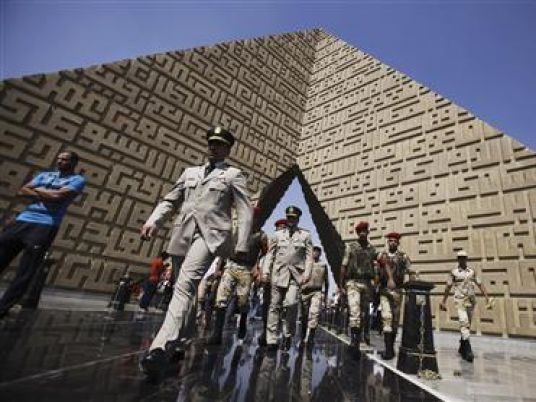The violence at the Nile City Towers 10 days ago left one dead and more than 22 injured, in addition to damaged property. It also created panic in the area and sparked a firestorm of rumors and speculations about the causes and possible ramifications of the incident, such as fears of more violence and worries that it signaled the beginning of the dreaded revolution of the hungry.
A man was shot dead by tourism police at the Fairmont Nile City hotel after storming the place to demand pay that he was refused for temporary security work. This incident sparked protest by an angry crowd outside the luxury complex, which called for police intervention. Residents of the Ramlet Bulaq shacks adjacent to the Nile City Towers have repeatedly protested a lack of state services and attempts by the owners to acquire their land. On 20 June, Cairo Governorate issued an order authorizing police to evict the shacks’ residents.
What the incident demonstrates in unambiguous terms is the absence of the state. Egypt is a country without a functional state. Its institutions have failed to respond to its denizens in the events leading up to the Nile City Towers attack and failed to respond to the emergency, which took place last week. It took the police and the fire department over an hour to arrive at the scene. In this context, it is no wonder that the owners of a high-end hotel and the capital’s prime office towers resort to hiring their own security services that may act outside the law to protect the property. It is also no wonder that when all fails, desperation can push citizens to take matters into their own hands to resolve personal grievances and business. The law has been absent, the state incompetent, and for Cairo’s poorest residents, glimmers of hope for a changing Egypt are quickly fading, leaving them in desperation. Three aspects of the Nile City Towers attack must be unpacked: The severe inequality sanctioned by the government in matters of urban development, the failure of emergency response mechanisms, and the narratives that dominate the media to fill the vacuum of fact-finding and comprehensive legal investigations.
Bulaq was once a thriving port town outside Cairo in the 17th century and later transformed into an industrial center in the 19th century. It has now become one of the capital’s poorest districts. Since the 1970s, it has been targeted by the state’s opaque development deals with investors that aim to cleanse the area of its original residents to clear the way for top-down development for the benefit of international investors and local partners.
Bulaq residents, who are in most cases the descendants of former residents of the area, are viewed by the state and by investors as obstacles to modernization rather than potential partners and stakeholders. Unlike many of Cairo’s self-built communities, popularly known as “informal,” Bulaq is a historic district with a once-thriving community. Many of the original homes from the past several centuries continue to crumble in the shadows of new developments such as the Ramses Hilton, the Foreign Ministry, the Nile City Towers and the St. Regis Hotel, which is now under construction.
Several parts of the district have witnessed forms of violence, which have included using paid “thugs” to threaten the communities and state security forces for forced evictions. Residents in the so-called “Maspero Triangle,” at the southern portion of Bulaq, continue to fear their forced evictions and dislocation to desert locations void of services and access to work.
Cairo Governor Abdel Qawy Khalifa earlier this year went ahead with a plan to evict residents and clear the area of all its buildings, without proper study or documentation and without allowing historians to participate in identifying architectural remains that should be conserved. The decision also ignored the rights of residents to have a say in the fate of their district.
That deal offered residents a choice between insufficient financial compensation and replacement apartments purportedly to be built in the same location. But the government has failed to gain the trust of residents, based on its history, and thus residents refused the deal.
Another portion of Bulaq, specifically Turguman, was previously evacuated with similar offers in order to build a central bus station. Hundreds of homes were removed to build the mammoth bus station and parking facility, and the former residents have ended up in desert outskirts or left to fend for themselves.
Ramlet Bulaq residents at the northern end of the district are aware of this history and have no reason to trust either the government or private investors. As recently reported in Egypt Independent, the land on which their homes are built is worth millions, yet they are being offered dismal amounts of compensation to be stripped of their property.
At the same time, the government refuses to provide the most basic services, such as electricity, water and gas, to all Cairo residents regardless of class. Schools and healthcare are also absent. Since 2002, Health Ministry officials have attempted to sell Bulaq General Hospital to private investors, taking a vital public health institution out of the area to make way for more parachuted development.
While the massive new towers have access to all the amenities, subsidized by the state, poor residents below have nothing. The drastic contrast between the glitzy towers and the desperate conditions of Ramlet Bulaq is a direct outcome of state policies that favor the rich and ignore the poor.
The second aspect demonstrated by the Nile City Towers incident is the failure of state institutions to protect even the rich. For a government whose policy for the past four decades has firmly favored the rich, it has still failed to even provide basic services to this selected privileged group.
Walk the streets of relatively affluent districts such as Zamalek, Heliopolis and Maadi and it will become clear that even in such areas, relatively small in the geography of Cairo, the state has failed to maintain clean streets and safe sidewalks. State services that should be available across the board to all citizens such as security and fire safety have failed to respond to two incidents related to the Nile City incident. The first was when a fire broke out in Ramlet Bulaq and residents were left with no way to put it out, which led to the death of a five-year-old child. Residents claim they sought help from Nile City Towers management and requested to use the tower’s fire hose, which was refused.
When violence broke out at the exclusive complex across the street from Ramlet Bulaq, fire respondents failed to arrive in time to put out fire ignited in parked vehicles. The police too failed to arrive in time to control the situation. These recent incidents only confirm what had become clear over the course of the past two years: illness in Egypt could be a death sentence for the poor, fires will be most likely left to burn to the ground, and the police will only be deployed by political order, not for the protection of citizens and their properties. In essence, while the state’s monopoly on violence has been directed towards political activities, security has been privatized and those who cannot afford it do not have it.
Finally, in the absence of an independent, functional judiciary and investigative apparatus whose job is fact-finding in the aftermath of incidents such as this, rumors and political spinning are rampant. In the context of an already inflamed situation in Egypt and while sectarian violence remains unresolved in the village of Dahshur, the risk of over-politicizing anything associated with Naguib Sawiris by his opponents remains high.
At the same time the official statement release by Nile City recycles the rhetoric of baltageya — thugs — overused by the Supreme Council of the Armed Forces and members of the former Mubarak regime to legitimize the use of violence to resolve the situation. The class-based category of baltagy, made into its own Ramadan drama this season, has been mythologized in ways that dehumanize a massive segment of Egypt’s population as perceived by the middle and upper class. The baltageya narrative confirms the constant need for a lower class to be feared, an internal threat, which if goes out of control must be dealt with firmly, even if by extralegal execution without due process. Adding the detail that the murdered assailant was a registered offender is meant to legitimize his death. In all this, once again the absence of the state leads to a highly fluid situation, where everything is negotiable, including death.
To whom does the city belong? And who has access to the services of state institutions? The legacy of the infitah policies of the 1970s, a rampant and unregulated form of crony capitalism, has had dire consequences on Egyptian society. The continued encroachment on public services and facilities has transformed a massive segment of the Egyptian economy into the so-called informal sector. State institutions have been made increasingly irrelevant in the lives of Egyptians and when it comes to cities, state services have deteriorated or disappeared altogether. The absence of the state, the institutions that were developed over the course of over a century of Egypt’s modern history, must be restored and fundamentally transformed to serve all citizens regardless of class, gender, race, creed or affiliation.
The recently appointed minister of housing, Tareq Wafiq, appears set to continue the line of previous government policies when it comes to housing and development. A fundamental shift is necessitated by the recent developments across the city culminating in the confrontation at the Nile City Towers.
Egyptians revolted last year not to replace one set of businessmen with another and not to continue the privatization of public services championed by the Mubarak regime under new names. Egyptians need to know: How is the Muslim Brotherhood’s Renaissance Project different from the Cairo 2050 plan when it comes to the future of Egypt’s capital? The residents of Ramlet Bulaq needn’t wait much longer to get their right to live in the city. Survival of the fittest cannot be law in revolutionary Egypt, where social justice was among the most basic demands of the people.
Mohamed Elshahed is a doctoral candidate at New York University. His research focuses on architecture and urban planning in Egypt from the 19th century to the present.
A shorter version of this article first appeared in Egypt Independent’s weekly print edition.




